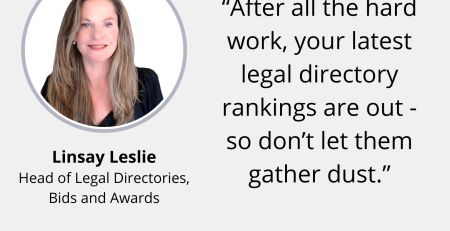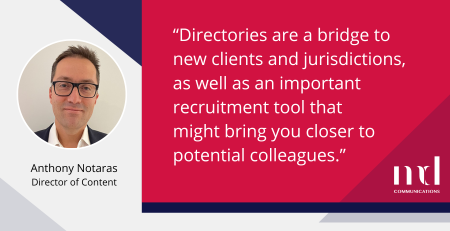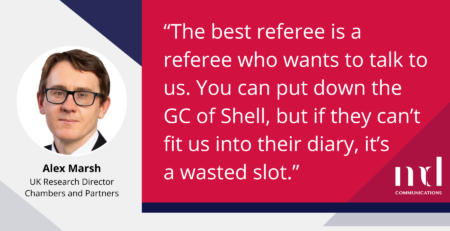The Tokyo Olympics may be over, but the Olympics of the legal sector (aka the official UK directories season) is just around the corner. Preparation for the research process can be intimidating – and it may seem tempting to skip the prep and leave the writing until the very last minute.
Luckily, Aleksandra Wawrzyszczuk, our Directories and Client Relationships Director, has some handy tips to help you kick things off.
1. Do not start the journey without a roadmap.
Treat the directories submission process as a complex project. Before you even download the submission template, set a clear timescale, specify action points, and determine key individuals in the process. Make sure you take note of any annual leave, major trials or deals that may affect your key partners’ availability, and account for these in your plan. The last thing you want to be doing is chasing fee earners at their busiest (and clients always take priority).
In planning the timeline, set the ‘official’ deadline a week or two earlier than advertised by the directory. Many of you will know how precious the extra time turns out to be when urgent client work disrupts your schedule!
2. Know thyself.
The directories process is not just an annual box ticking exercise: there is much more to it than tiers and bands. It provides you with an opportunity to reflect on the last year’s achievements, assess progress against business plans, rethink your position in the market, and consider your future goals. It can even result in better pitches.
Take your time, be honest and dig deep: what were your key successes last year? Have you had any major areas of expansion? Also consider where you are weakest. Have you lost any key partners or have any key clients migrated their substantive work to another firm? Doing the heavy lifting early in the process will set the stage for your messaging in the submissions and make the writing much easier later on.
3. Set your destination – and beware of the scattergun approach.
As part of your reflective exercise, have a look at last year’s results and take time to define your priorities. Whether it’s a first-time inclusion, a promotion, or making a stronger case for individual lawyer tables, use your aspirations as a starting point.
Not only should each submission have a clear goal in mind, but you also need to prioritise. It is likely that you will not be able to get interviews for all your practice areas, so it’s helpful to identify the strongest (and the weakest) spots in advance and target them from the start.
4. Always a marathon, never a sprint.
Although achieving your desired spot in the rankings may seem like the ultimate goal, remember that not all your wishes will come true, regardless of how much effort you put in into drafting the submissions. There are always factors you can control (such as how well you present your achievements) and those that you cannot (for example, performance of your competitors).
However, if you think about the rankings as a strategic long-term commitment, rather than the necessary evil that you rush through the finish line at the last minute, you may be surprised – not just with your steady long-term progress, but also with the added value for your other BD activities. Encouraging partners to focus on the long game also helps manage internal expectations and maintain momentum year on year.
Whether the prospect of planning your directory submissions is giving you a headache, or you are a pro looking to improve your current practices, our team – which includes in-house heads of bids and directories, lawyers, and directory researchers – can assist. We combine years of experience from all angles of the directories process and can help design and embed tailored processes, audit and improve your current practices, and support your strategic directories and wider BD projects.
Get in touch with Linsay Leslie or Aleksandra Wawrzyszczuk












